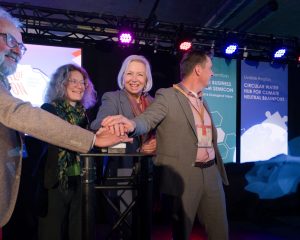“I’ve played an active role in Eindhoven Engine by making the right connections between my Fontys colleagues and the members of the Eindhoven Engine community. I inform my colleagues of interesting subjects so that they can connect or write a proposal for a call. You could call me an ‘in-between’.”
After many years at Fontys University of Applied Science and three years as their liaison manager in Eindhoven Engine, Kees Adriaanse is stepping away from both organizations. How has the Engine changed during this time and what are his hopes for his successor? Kees looks back on a variety of achievements, as well as the wicked challenges he’d like to see solved.
Back to the start
As one of the three Eindhoven Engine stakeholders (alongside TNO and Eindhoven University of Technology), the main benefit for Fontys is increased collaboration with partners in both industry and academia – something which Kees has also shaped by bringing together research groups and students in relevant projects. He also emphasizes the unique nature of collaboration within the Engine as a major advantage: “The most important aspect is co-creation. It’s very important that people from different projects can meet each other at the coffee corners to inspire each other. In the near future, I hope that the coffee corner will be the boardroom of Eindhoven Engine!”

“The most important aspect is co-creation. It’s very important that people from different projects can meet each other at the coffee corners to inspire each other.”
Kees Adriaanse
Fontys Liaison Manager
Regarding changes over the last few years, Kees also notes that Eindhoven Engine was initially an organization with low TRL projects and few students. “I’m proud that we’re getting more students in most of the projects,” he says, pointing to SmartMan as an example of the intersection between academia and SMEs. “Compared to my dreams at the beginning of Eindhoven Engine, we went much further than I thought was possible and have achieved a lot in these last three years.”
Reaching all parts of society
As for the future, Eindhoven Engine’s focus in increasingly turning to societal problems and the use of technology in areas such as health, energy and agri-food. “I think it will be important to get even more new research areas,” Kees suggests. “For example, there are many people who learned to read and write at school but no longer really know how to do either. How can we help these people? That’s a dream for me: that Eindhoven Engine projects can help low-literate people or people without good mobility, for instance.” Such societal challenges need to be tackled and give Eindhoven Engine the opportunity to showcase how we co-create and come to meaningful innovation. One example of such a project in the Brainport region is Eindhoven Engine’s work with Eindhoven Library on a technical solution to improve the connection between low-literates and society.

Despite reaching retirement age, this isn’t quite the end of Kees’ career. “For three days a week, I’ll go back to where I started as a physics teacher many years ago. That’s because physics is a nice discipline and I want to spend the last years of my working experience in a secondary school,” he concludes. “I want to say one more thing to my successor: make project teams not only with people from universities and polytechnicals but also with more surprising groups of people, like schoolchildren, people of 70 or 80 years old or actors and painters. Of course, it’s important to have people with high qualifications on technical subjects. But people from other parts of society can give you another view. Inclusivity means making sure that not only highly educated people benefit from the Brainport region but also the people living here, and we can help with that.”
